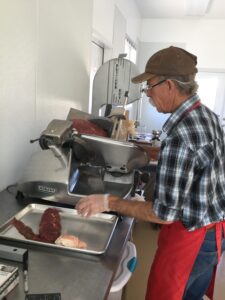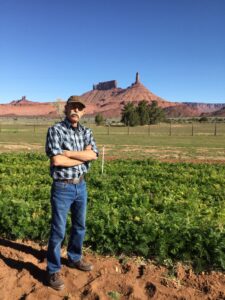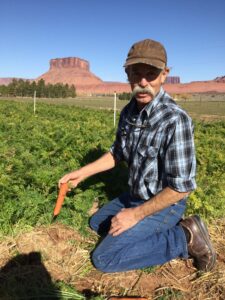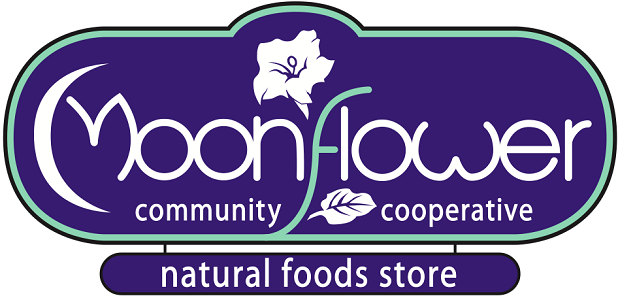In early November, I arranged a time to visit and interview Greg Nunn, a long time member of the Moab valley community and an avid flint knapper, jerky purveyor, and cultivator of impressive carrots and peppers. On November 6th, I pulled into Greg’s driveway in Castle Valley and found him hard at work in his jerky processing kitchen. Listening to reggae and wearing a bright red apron, Greg noted his pasilla pepper seed stock drying on the windowsill and continued to slowly slice beef sourced from a ranch outside Cortez, Colorado while delving into his family’s history.

Greg Nunn slicing his locally sourced beef
Greg’s nuclear family arrived in Moab from Santa Paula, California in 1971 when he was fifteen years old. Southern California’s Ventura County boasts the title of the “citrus capital of the world,” and his grandfather successfully cultivated citrus in the region. Greg’s family developed a cattle ranch and practiced dryland farming on Wilson Mesa. While Greg continued to work sporadically on his family’s ranch, he eventually purchased property and built a home in Moab and began to carve out his own life.
He sold his Moab property in the 1980s and decided to purchase his current ten acre property in Castle Valley. In the 1980s, Greg paid a mere $1,100 per acre. Moab had only begun to gain popularity as a tourist destination and internationally renowned hub for mountain biking. The uranium mining industry subsequently tanked, leaving the Moab economy in disarray. Greg lived in a trailer and began building a house a few years later. He aspired to farm the entire property and establish a homestead. Due to a crippling drought and complicated family dynamics, Greg’s family sold their property on Wilson Mesa in the 1990s.
As Greg explored the possibility of growing food on his land in Castle Valley, he submitted soil samples and learned that the mineral and nutrient content of the sandy soil would be particularly suited for the cultivation of root vegetables. Instead of embracing a typical market garden farming model, Greg firmly believes that small-scale growers should focus their energy on a few crops and perfect their growing techniques over time. He settled on primarily cultivating carrots and peppers due to their complimentary growing seasons. Greg plants his carrots in July, and the harvest begins in October and generally continues through April. During their long growing season in the summer and early fall, Greg harvests pasilla and other pepper varieties. For several years, he sold bell peppers and carrots to Rainbow Natural Foods, a small food distribution company which emerged from the alternative food movement of the 1960s and 1970s.
“That’s where people go wrong. They try to grow too much. Too many different things. [Pick] just a few items. And… you can [try to] make those few items make a continuous income.” – Greg Nunn

Greg standing proudly in front of his carrot beds with Castleton boldly displayed in the distance
After experiencing a pepper fiasco one year, Greg explored other income generating options that did not depend as heavily on Moab’s fluctuating economy. He developed a passion for flint knapping, and his rigorous dedication to self-study blossomed into an expertise on the subject. He eventually sold to private stone tool collectors and participated in numerous excavations. Greg continues to work alongside Ph.D researchers and archeologists despite only attaining a high school education. Unfortunately, the actual processing of shaping flint can cause pneumonia and eventually silicosis, a disease of the lungs caused by the inhalation of silica dust. Greg noticed early signs of silicosis in himself and decided to mostly retire from the practice aside from occasional private projects. The building he currently uses for jerky processing was intended to be a lithic research center for people to travel from all over the world and study stone tools, but he decided to focus on cultivating and processing food items instead.

Eventually, Greg began selling his Nunn Better carrots to Moonflower Co-op. Derek Whitworth, Moonflower’s current General Manager, learned about Greg’s carrots from Conrad Sorensen, the founder of Lifestream, Moonflower’s predecessor. Prior to Conrad’s departure from the Co-op in 1999, Greg began selling his carrots to both Rainbow Natural Foods and the Co-op. When Derek returned from his brief hiatus from Moonflower in 2015, he asked Greg to grow carrots for the Co-op. Derek offered a fair price and a predictable market for Greg’s carrots, and they have remained a local produce staple ever since.
Greg also dabbles in several other projects on his Castle Valley property. He grows about 80 pounds of garlic per year and creates his own garlic powder, and much of this is incorporated into his signature jerky products. He boasts a small orchard featuring peaches, pears, plums, apples, and apricots and has experimented with cherries, nectarines, and almonds over the years. He once produced 50 gallons of wine per year from his grape vineyard, and recently he began making grape juice instead. He enjoys growing dahlias to sell as cut flowers to Forget Me Not, Moab’s local flower shop, and he cultivates a wide variety of native plants around his home.
Greg aspires to increase production every year to keep up with local demand for his carrots. He hopes that he will have carrots through June. He wants to experiment with seeding carrots in the early spring to continue carrot production into the summer, but spring planting presents some unique challenges, namely cut worms and flea beetles. He initiated a nematode program this fall and plans to treat his beds again in the spring to attack their larva.
“As long as my ground will hold up and my body will hold up, I’ll continue.” – Greg Nunn
Between producing Nunn Better carrots and jerky, Greg doesn’t have a day off. Crafting his products occupies most of his daylight hours, and he admits to struggling to find reliable, full time help in Castle Valley. However, Greg remains dedicated to providing Moab with nutritious and flavorful produce and value-added products throughout the year. Greg embodies the passion, tenacity, and resourcefulness required to farm successfully in a globalized, industrial food economy. Tangibly supporting and developing relationships with our local producers are essential components of strengthening our local economy and building community resilience. Residents of Moab and surrounding areas can find Greg’s Nunn Better carrots, pasilla powder, and jerky at Moonflower Co-op.
Article by Steph Hamborsky
